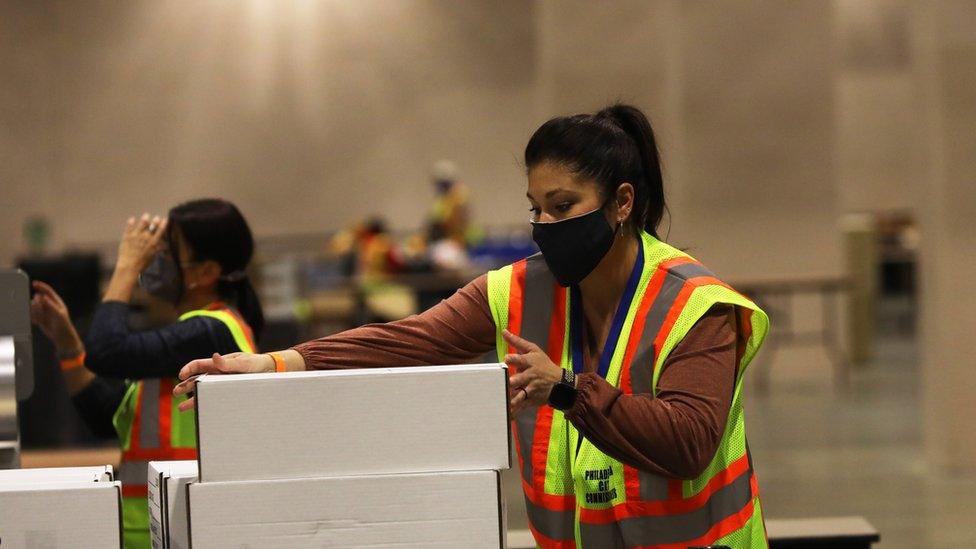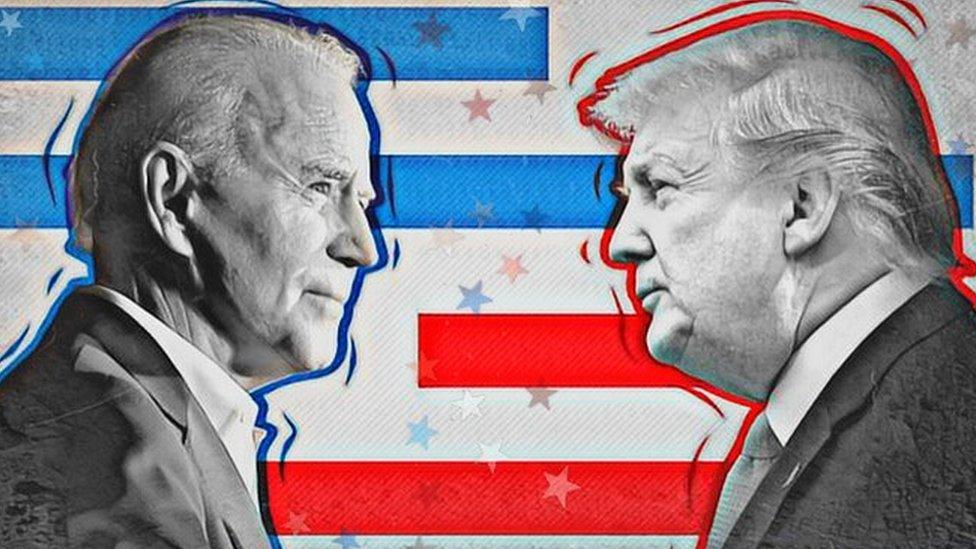US election: What happens next?
- Published
- comments

It's close between Donald Trump and his rival Joe Biden as both men, their parties, America and the world wait for a result in the US presidential election.
Joe Biden, who represents the Democratic party, says he is "on track" to victory, while Mr Trump, a Republican, is claiming "a big win".
But with lots of votes still to be counted, the result could still go either way.
So what happens next?
There are still lots of votes which need to be counted.
The coronavirus pandemic means many people decided not to vote in person, with more than 100 million Americans voting before Tuesday's election day.
The US is on course for its highest voter turnout in 100 years.
At the moment we don't know who has won the election, because not enough votes have been counted for either Donald Trump or Joe Biden to claim victory.
And, all of those postal votes could take a while to count...
WATCH: Five things you NEED to know about the US Election
But some states have already been decided!?
In the US election, the number of votes you win is less important than where you win them.
That's thanks to something called the Electoral College - which is basically a winner takes all contest in each state.
The larger the state, based roughly on population, the more electoral college votes it has. The first candidate to win 270 electoral college votes in total wins the election.
So far neither Trump nor Biden have reached that figure.
We already know the results in some states, but a lot of them normally vote for either party and aren't as important as other states that are yet to be decided.
The 2020 US election will be won and lost in key areas known as battleground states or 'swing states' which are crucial for the result of the election - voters in those places could choose either candidate.
President Trump has won the key state of Florida, which is important because it often swings between parties at elections and has a lot of electoral college votes, with 29.
But Mr Biden could win in Arizona, which has traditionally voted for Donald Trump's republican party.
Other key states such as Georgia, Pennsylvania, Wisconsin, Michigan and North Carolina are still undecided and could go either way, as could the election result at this stage!

Election workers counting votes in Philadelphia, Pennsylvania - a key state that could vote either way
A result might not take days...but weeks!
It's not just about counting votes - if there are any legal challenges to the results, there could be an even longer wait.
Donald Trump has said previously that he would mount a legal challenge if the result is close. This means lawyers could get involved and a result could potentially take weeks and maybe even months.
Both candidates have a right to demand a recount in most states, usually if the result there is tight.
The huge numbers of American adults voting by post this year means the validity of these votes, if they arrived after Tuesday's voting day, could be challenged in court.
Both the Republican and Democratic parties have said they're preparing for legal disputes after the election.
A legal dispute could end up in the US Supreme Court - the highest court in America and the ultimate legal authority in the US.
What is the US Supreme Court and why does it matter ahead of this election?
This happened in 2000 when the election result took weeks to be decided. The US Supreme Court stopped a recount in Florida and ruled in favour of Republican, George W Bush who became president.
This year it could be significant because Donald Trump has just appointed Amy Coney Barrett to the US Supreme Court, meaning it now has six Republican favouring justices, compared to just three who tend to side with the Democratic party when it comes to making decisions.
When do we need a result
Whatever happens, Donald Trump is president until the end of his term in January next year.
But if the result of the election takes weeks, or months... it needs to be decided before 20 January 2021.
That's the day when the winner of the US presidential election gets inaugurated and has to start the job, spending the next four years in the White House until this all happens again in 2024.
- Published7 November 2020

- Published23 October 2020

